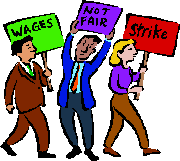AFL-CIO NOW BLOG: By Tula Connell On July 22, 2009 @ 2:01 pm In Corporate Greed, Economy
Two news items out today highlight how far the nation needs to go in re-balancing the economy toward working people.
First, Think Progress [1] points to a Wall Street Journal analysis that shows more than one-third of all pay in the U.S. now goes to [2] executives and other highly-paid employees.
Highly paid employees received nearly $2.1 trillion of the $6.4 trillion in total U.S. pay in 2007, the latest figures available. The compensation numbers don’t include incentive stock options, unexercised stock options, unvested restricted stock units and certain benefits.
The Wall Street Journal based its analysis on Social Security Administration data, which doesn’t count billions of dollars more in pay that remain off federal radar screens that measure wages and salaries.
Next, it turns out that Bank of America, which received $45 billion in taxpayer-funded bailout support, [3] has spent more than $1.5 million lobbying on Capitol Hill.
The Charlotte, N.C., company wants flexibility on spending the bailout funds and also wants to fend off restrictions on executive compensation, home mortgage lending and credit card fees. The bank also is lobbying on a consumer rights bill, on student lending issues, on a bill that would’ve allowed bankruptcy judges to alter mortgages and on a proposed federal regulatory oversight agency.
And none of its positions on any of these bills would help working families.
As we noted in April when we released the [4] AFL-CIO Executive PayWatch data, the Bank of America lost nearly $2.4 billion in the fourth quarter of 2008 due to deeper than expected trading and loan losses. Even after receiving billions of dollars in taxpayer money, the bank plans to eliminate up to 35,000 jobs over the next three years—but [5] CEO Kenneth Lewis collected nearly $10 million in 2008, more than 400 times the average amount a bank teller is paid each year. Since becoming CEO in April 2001, Lewis received $134 million in pay, bonuses, stock awards and pension accruals.
As Think Progress notes, between 1979 and 2006, the inflation-adjusted after-tax income of the richest 1 percent of households [6] increased by 256 percent, compared with 21 percent for families in the middle income quintile.
While U.S. worker productivity has skyrocketed over the past 30 years, [7] wages have not kept pace.
America’s working middle class made it clear last November that they wanted change—and reshaping the nation’s economic framework to strengthen the middle class and close the wage disparity between the very top and the rest of us, is fundamental to that change.
Article printed from AFL-CIO NOW BLOG: http://blog.aflcio.org
From the Labor Commission of the CPUSA, updates, information, news, analysis, and organizing materials in solidarity with workers of the world.
Subscribe to:
Post Comments (Atom)


No comments:
Post a Comment